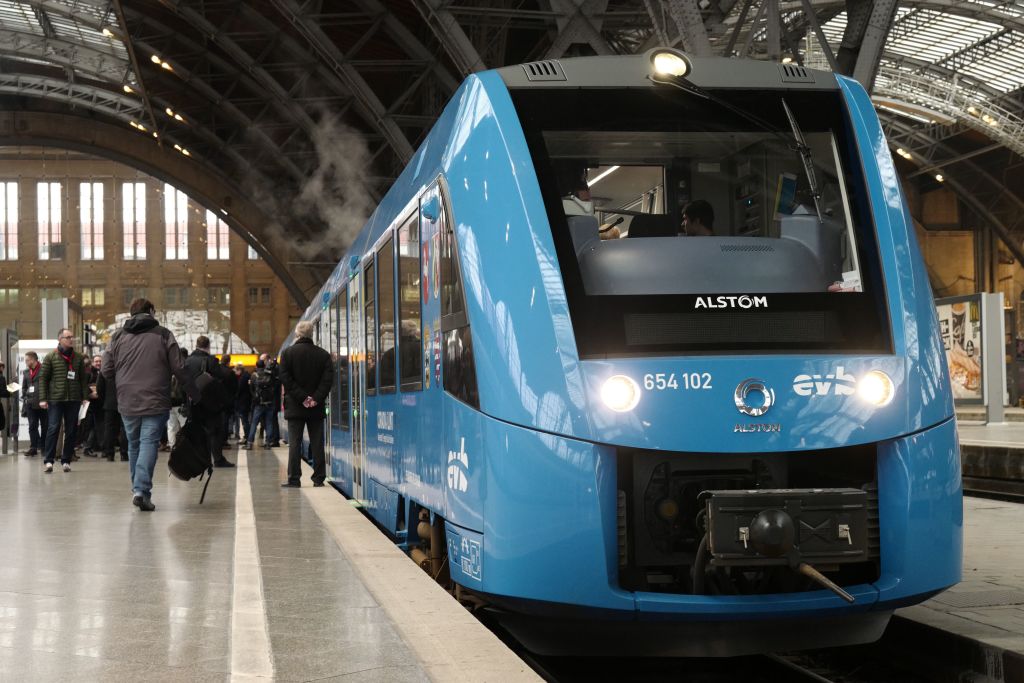Germany launches the world's first hydrogen-powered trains


A free daily email with the biggest news stories of the day – and the best features from TheWeek.com
You are now subscribed
Your newsletter sign-up was successful
Germany launched the world's first eco-friendly rail line consisting of 14 hydrogen-powered passenger trains Wednesday. These will replace 15 diesel trains in the state of Lower Saxony, reports The Associated Press.
According to a press release, the state subsidiary LVNG had been looking for an alternative plan to replace diesel fuel since 2012. "The German government has backed expanding the use of hydrogen as a clean alternative to fossil fuels," writes AP.
Germany invested about 93 million euros ($92 million) into the project to "make its economy greener."
The Week
Escape your echo chamber. Get the facts behind the news, plus analysis from multiple perspectives.

Sign up for The Week's Free Newsletters
From our morning news briefing to a weekly Good News Newsletter, get the best of The Week delivered directly to your inbox.
From our morning news briefing to a weekly Good News Newsletter, get the best of The Week delivered directly to your inbox.
The 14 trains, manufactured by the French company Alstom, are emissions-free and low-noise. Only operating on hydrogen fuel cells to generate electricity, the trains will have a range of 1,000 kilometers (621 miles), which means that a train can run for an entire day with a single tank of hydrogen.
CNN writes that the President of Lower Saxony, Stephan Weil, called the news a "model for the rest of the world" and "a milestone on the road to climate neutrality in the transport sector."
The trains' next stop will be in Frankfurt, eventually making their way to Italy and France.
A free daily email with the biggest news stories of the day – and the best features from TheWeek.com
Anahi Valenzuela has worked as an editorial assistant at The Week since 2022, where she assists with magazine content and covers the week's best photos. She started her career as a media producer at The Daily Californian and a writer for College Magazine.
-
 Political cartoons for February 16
Political cartoons for February 16Cartoons Monday’s political cartoons include President's Day, a valentine from the Epstein files, and more
-
 Regent Hong Kong: a tranquil haven with a prime waterfront spot
Regent Hong Kong: a tranquil haven with a prime waterfront spotThe Week Recommends The trendy hotel recently underwent an extensive two-year revamp
-
 The problem with diagnosing profound autism
The problem with diagnosing profound autismThe Explainer Experts are reconsidering the idea of autism as a spectrum, which could impact diagnoses and policy making for the condition
-
 TikTok secures deal to remain in US
TikTok secures deal to remain in USSpeed Read ByteDance will form a US version of the popular video-sharing platform
-
 Unemployment rate ticks up amid fall job losses
Unemployment rate ticks up amid fall job lossesSpeed Read Data released by the Commerce Department indicates ‘one of the weakest American labor markets in years’
-
 US mints final penny after 232-year run
US mints final penny after 232-year runSpeed Read Production of the one-cent coin has ended
-
 Warner Bros. explores sale amid Paramount bids
Warner Bros. explores sale amid Paramount bidsSpeed Read The media giant, home to HBO and DC Studios, has received interest from multiple buying parties
-
 Gold tops $4K per ounce, signaling financial unease
Gold tops $4K per ounce, signaling financial uneaseSpeed Read Investors are worried about President Donald Trump’s trade war
-
 Electronic Arts to go private in record $55B deal
Electronic Arts to go private in record $55B dealspeed read The video game giant is behind ‘The Sims’ and ‘Madden NFL’
-
 New York court tosses Trump's $500M fraud fine
New York court tosses Trump's $500M fraud fineSpeed Read A divided appeals court threw out a hefty penalty against President Trump for fraudulently inflating his wealth
-
 Trump said to seek government stake in Intel
Trump said to seek government stake in IntelSpeed Read The president and Intel CEO Lip-Bu Tan reportedly discussed the proposal at a recent meeting
